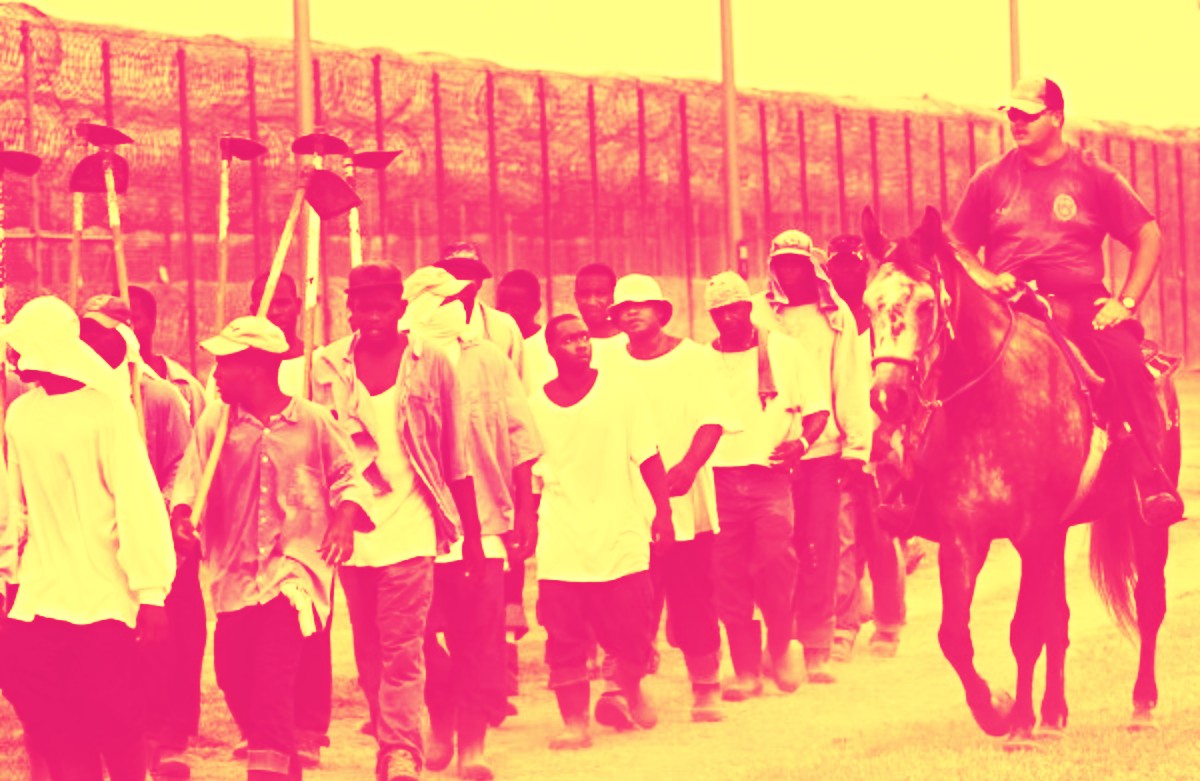Filed under: Action, Incarceration, Labor, US, White Supremacy

On Tuesday, inmates took part in a work stoppage at the infamous Angola prison in Louisiana to decry prison slavery. Angola is known for iconic pictures of prisoners laboring on the former slave plantation which played a major role in the implementation of racial slavery in the United States. Under the 13th Amendment, unpaid labor, IE slavery, is permitted to continue under the law, as long as the person doing the work is a ward of the State.
Quote from inside Angola:
"We want the word to be out that we are human beings and we have human rights. We are demanding justice. We want classrooms for our education and rehabilitation, not slavery. Inmates at Angola are demanding an end to slave labor."
— #FreeKeithDavisJr #BDS ?? (@jaybeware) May 8, 2018
The work stoppage at Angola and the issuing of multiple demands against prison slavery, point to an increased push by incarcerated workers towards a growing call for a national prison strike to begin on August 21st until September 9th, the anniversary of the Attica Prison Uprising. September 9th is also second anniversary of the national prison strike in 2016 which grew to involve tens of thousands of prisoners across the US, including groups of prisoners in Mexico and Greece.
BEHIND THE WALL. LEE COUNTY CORRECTIONAL: PRESS PLAY. SHARE. #MessageFromInmate #PrisonReform #freedomfightersSC #Protest #May19 pic.twitter.com/vXZnGf4PLb pic.twitter.com/YMjOOuXHfz
— Traci Young Fant (@Fantastik1) May 8, 2018
The national prison strike marked a turning point in the prison struggle in the United States, and was followed by both the Vaughn Uprising as well as #OperationPUSH in Florida prisons at the start of 2018. Most recently, horrific conditions at the Lee Correctional facility in South Carolina, in which prisoners were locked inside cell blocks by guards and pushed to fight to the death over contraband items. As reported on IGD in interviews with prisoners on the scene, prison staff also denied medical care and let prisoners bleed to death. This horrific massacre at Lee Correctional spurred prison abolitionist organizers to call against for a national strike against horrific and inhuman conditions inside the growing centers of mass incarceration. There is also a rally scheduled outside of the prison on May 19th.
In regards to the incident at Angola, according to Benjamin Fearnow at Newsweek:
A brief fight between two inmates and two Louisiana State Penitentiary guards spilled over into an ongoing prison work stoppage this week, with inmates demanding an investigation into “slavery” at the state prison farm.
The inmates at the infamous Angola prison, named for the former slave plantation on which it sits and from which many of the slaves came in Central Africa, issued a list of demands through an inmate union Tuesday to news media, state government officials and all “supporters of the freedom movement to end legalized slavery.” The inmates behind the “Decarcerate Movement” asked that the government prevent “the circumstances and conditions that have been allowed to fester in the oppressive environment, do not allow for rehabilitation, but make sinking further into oppression” following the Tuesday scuffle that sparked the protest.
https://twitter.com/SlaveryPrison/status/993967460104761350
In a press release, local organizers with Decarcerate Louisiana laid out the reasons for the strike:
Today Tuesday May 8, 2018 Prisoners throughout the state of Louisiana began a Cease w Peace Work Stoppage to protest the inhumane conditions, ill treatment & lack of rehabilitative services, identified in the state of Louisiana’s Department of Corrections regulations.
The circumstances and conditions that have been allowed to fester in the oppressive environment, do not allow for rehabilitation, but make sinking further into oppression
“We want to prove that we can change, and that we can become productive members of society.”
There are circumstances that occur in poverty-stricken areas that do not create a conducive environment for learning and developing opportunities ….
The blight that is in many neighborhoods, create these criminal environments, all too often out of necessity.
The ONLY people who are being held accountable are the victims, and the so called “criminals”. Where is the government responsibility for creating this environment?
We demand immediate reparative & restorative justice!
These are our DEMANDS:
1. We believe that all living human beings are created equal and have inalienable rights to life, liberty, and the pursuit of happiness, regardless of their social status.
2. We believe in human rights and human dignity and that government has a fundamental obligation to protect all its citizens from slavery and human degradation.
3. We are demanding a national conversation inquiring how state prison farms across the country came to hold hundreds of thousands of people of African descent against their will.
4. We are urging that local, state, and federal governments who currently hold hundreds of thousands of African Americans on prison farms across the country be investigated for antebellum criminality, involuntary servitude and slavery.
5. We are demanding an end to the systematic oppression and exploitation of prisoners and their outside family and supporters for profits.
6. We are demanding class rooms for our education and rehabilitation, not slavery.
The growing prison strikes should be seen in the context both of the other mass strikes happening across the US, as well as the black liberation struggle against police and white supremacy. In many cases, prison labor has been used to phase out union workers from the economy, making billions for corporations and private prisons in the process. At the same time, calls by politicians like Jeff Sessions to reignite the drug war only means a drive by a section of the elites to return to decades of brutal policies which have long been discredited, but also mean an increased flow of bodies into the prisons.
As the prison struggle again intensifies and we approach the national prison strike on August 21st, we must find ways to not only show support with those on the inside, but expand the struggle and make it our own on the outside.





